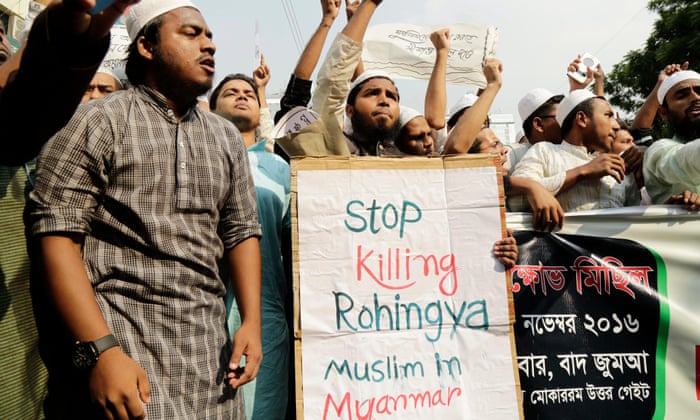A 38-year-old man told Amnesty: “My sister and brother were both kidnapped by the army. I saw with my own eyes how the military burned down our village, and how soldiers raped women and girls.”
Another man, aged 58, said: “We saw helicopters firing on the village. We ran into the forest to save our lives.”
A woman aged 44 said soldiers had handcuffed young men in her village before shooting them dead and pushing their bodies into mass graves.

“The response of the army to the attacks on security forces six weeks ago went far beyond what was necessary and proportionate,” said Patel. “Instead of investigating and arresting specific suspects, the army carried out operations amounting to collective punishment.”
There are about 1 million Rohingya in Myanmar who are denied citizenship. Hundreds of thousands have fled to Bangladesh, many of whom live in camps in Cox’s Bazaar. The Bangladesh government has refused to grant refugee status to Rohingya arriving from Myanmar since 1992.
Thousands of Rohingya Muslims who have fled to Bangladesh from Myanmar where they have been attacked by security forces are being pushed back by the Bangladeshi authorities, according to Amnesty International.
Those that do make it to makeshift camps in the town of Cox’s Bazaar are facing shortages of food and water, and some are suffering from severe malnutrition.
The Rohingya are fleeing military operations in Myanmar in which scores of people have been killed and as many as 30,000 displaced. The attacks are in reprisal for an assault on three border posts last month that left nine Myanmarpolice officers dead, but the Rohingya have been persecuted in the country for years.
Bangladeshi border guards have detained and forcibly returned hundreds of people, Amnesty said on Friday. The actions were in violation of international law, which prohibits the return of people to a country or place where they are at serious risk, it added.
“The Rohingya are being squeezed by the callous actions of both the Burmese [Myanmar] and Bangladesh authorities,” said Champa Patel, Amnesty’s South Asia director.
“Fleeing collective punishment in Burma, they are being pushed back by the Bangladesh authorities. Trapped between these cruel fates, their desperate need for food, water and medical care is not being addressed.”
She added: “The Bangladeshi government must not add to the suffering of the Rohingya. They should be recognised and protected as refugees fleeing persecution, not punished for who they are.”
Earlier this week, a senior UN official, John McKissick, accused Myanmar of seeking to ethnically cleanse the country of its Muslim minority.
Aung San Suu Kyi, Myanmar’s de facto leader, has been criticised for not doing more to end the military actions, which – according to witness accounts given to Amnesty – include firing at villagers from helicopter gunships, torching hundreds of homes, carrying out arbitrary arrests and raping women and girls.
The Myanmar government has denied allegations of human rights violations by the military and has accused “Rohingya lobbyists” of disseminating fabricated accounts. Access to the area for aid workers, human rights monitors and independent journalists is effectively barred, said Amnesty.
No comments:
Post a Comment